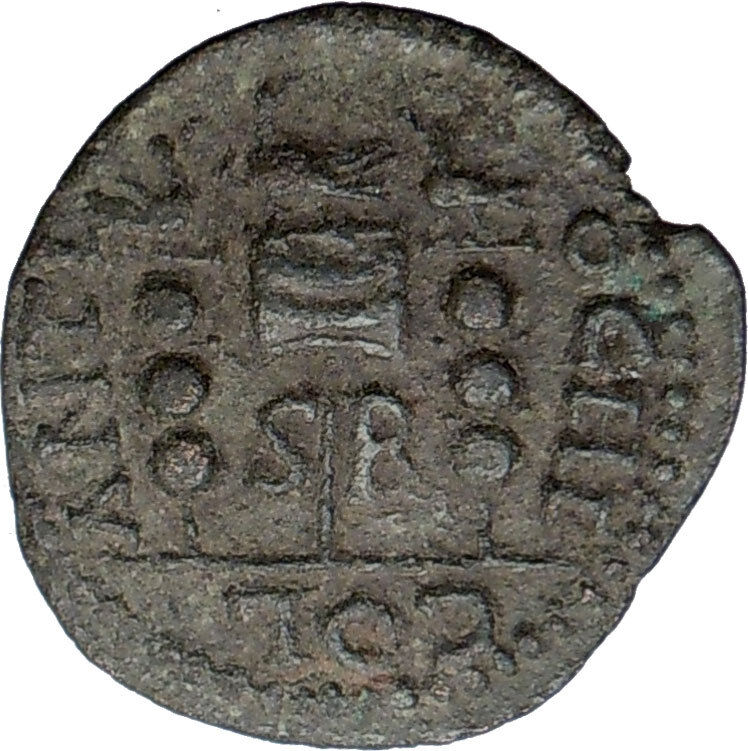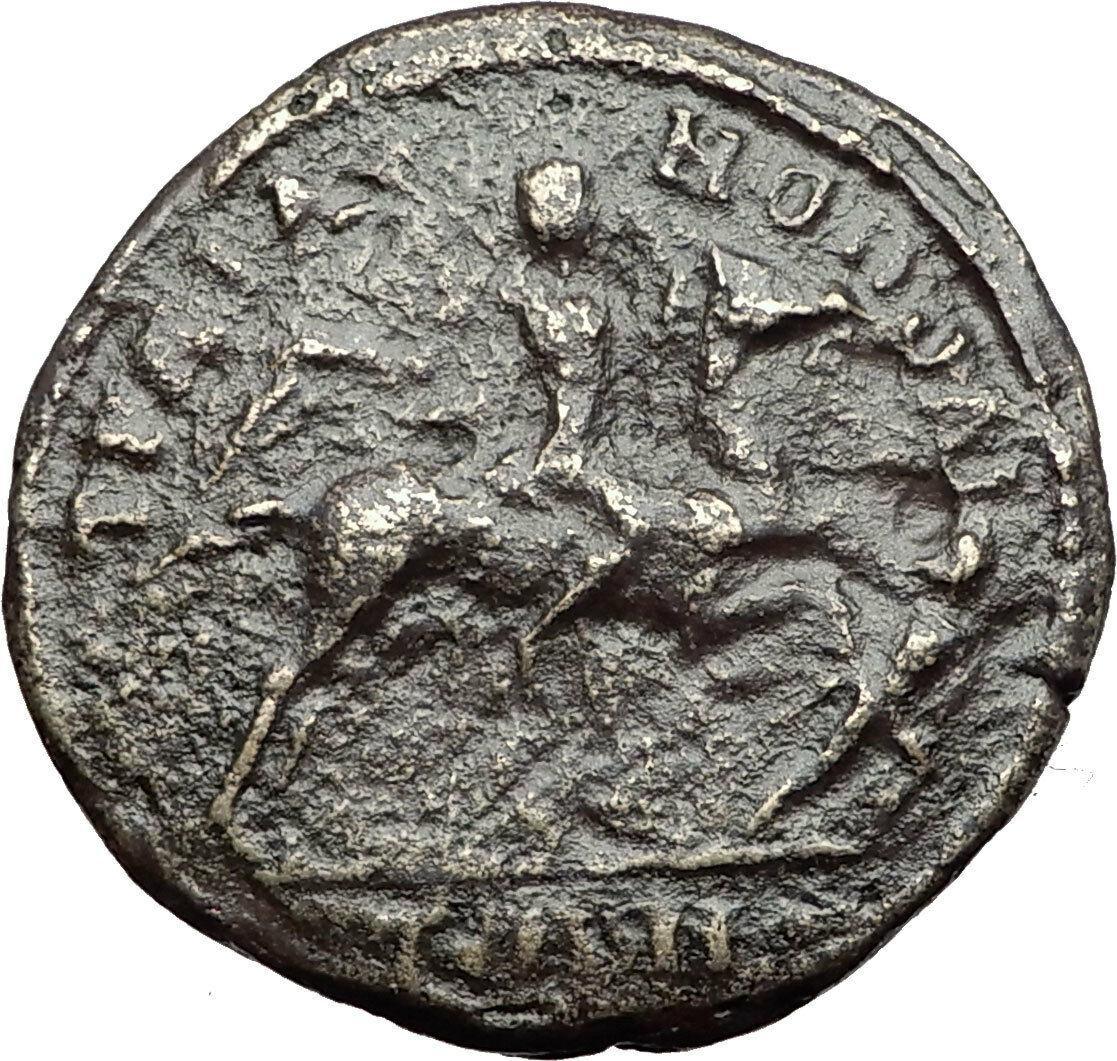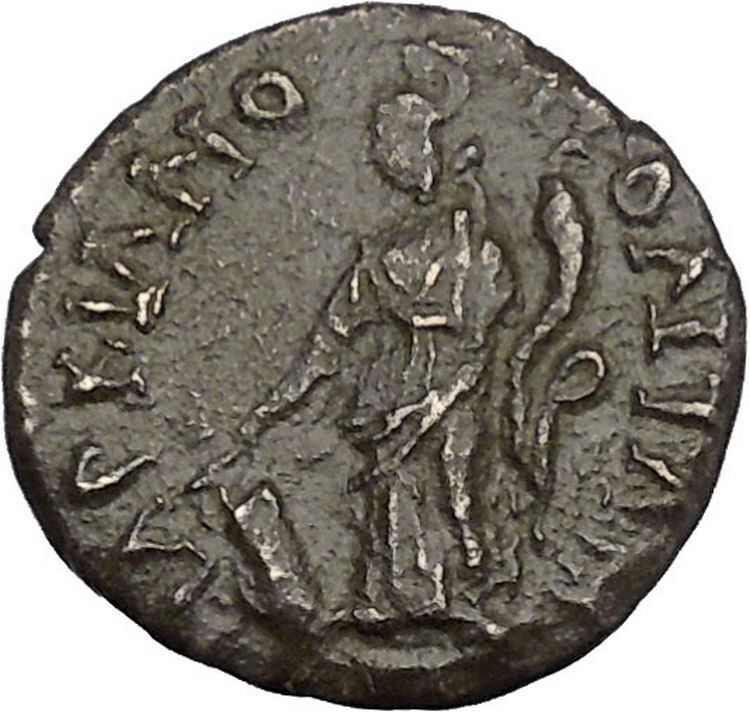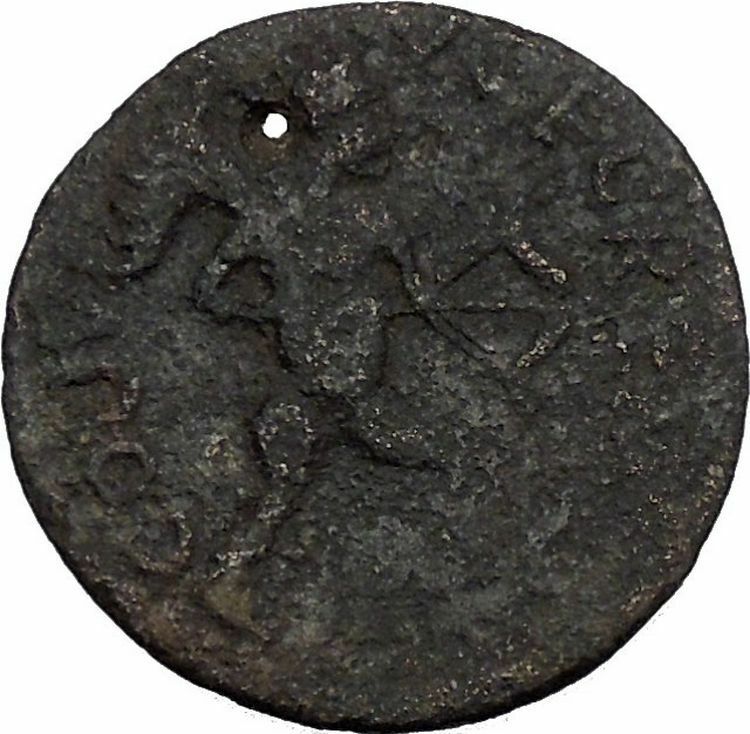|
Vespasian
–
Roman Emperor
: 69-79 A.D. –
Bronze 20mm (3.71 grams) of
Antioch in
Seleukis and Pieria
Reference: Butcher 7; McAlee 375. RPC 1988. RIC 1568
IMP VESP AVG P M T P, Laureate head left.
ANTIOCHIA, Turreted and draped bust of Tyche right.
You are bidding on the exact item pictured,
provided with a Certificate of Authenticity and Lifetime Guarantee of
Authenticity.
Tyche (Greek for luck; the Roman equivalent was
Fortuna
)
was the presiding
tutelary deity
that governed the fortune and
prosperity of a city, its destiny. Increasingly during the Hellenistic period, cities had their
own specific iconic version of Tyche, wearing a
mural crown
(a crown like the
walls of the city).

The
Greek historian Polybius
believed that when no cause can be
discovered to events such as floods, droughts, frosts or even in politics, then
the cause of these events may be fairly attributed to Tyche.
Stylianos Spyridakis concisely expressed Tyche’s appeal in a
Hellenistic world of arbitrary violence and unmeaning reverses: “In the
turbulent years of the
Epigoni of Alexander
, an awareness of the
instability of human affairs led people to believe that Tyche, the blind
mistress of Fortune, governed mankind with an inconstancy which explained the
vicissitudes of the time.”
In literature, she might be given various genealogies, as a daughter of
Hermes
and
Aphrodite
, or considered as one of the
Oceanids
, daughters of
Oceanus
and
Tethys
, or of
Zeus. She was connected with
Nemesis
and
Agathos Daimon
(“good spirit”).
She was uniquely venerated at
Itanos
in Crete, as Tyche Protogeneia,
linked with the Athenian
Protogeneia
(“firstborn”), daughter of
Erechtheus
, whose self-sacrifice saved the
city.
She had temples at
Caesarea Maritima
,
Antioch
,
Alexandria
and
Constantinople
. In
Alexandria
the Tychaeon, the temple of
Tyche, was described by
Libanius
as one of the most magnificent of the
entire Hellenistic world.
Tyche appears on many
coins
of the Hellenistic period in the three
centuries before the Christian era, especially from cities in the Aegean.
Unpredictable turns of fortune drive the complicated plotlines of
Hellenistic romances
, such as
Leucippe and Clitophon
or
Daphnis and Chloe
. She experienced a
resurgence in another era of uneasy change, the final days of publicly
sanctioned
Paganism
, between the late-fourth-century
emperors
Julian
and
Theodosius I
who definitively closed the
temples. The effectiveness of her capricious power even achieved respectability
in philosophical circles during that generation, though among poets it was a
commonplace to revile her for a fickle harlot.
In medieval art
, she was depicted as carrying a
cornucopia
, an
emblematic
ship’s rudder, and the
wheel of fortune
, or she may stand on the
wheel, presiding over the entire circle of fate.
The constellation of
Virgo
is sometimes identified as the heavenly
figure of Tyche, as well as other goddesses such as
Demeter
and
Astraea
.
Titus Flavius Vespasianus, known in English as Vespasian (November
17 9
AD –
June 23
79AD),
was a
Roman Emperor
who reigned from 69 AD until his
death in 79 AD. Vespasian was the founder of the short-lived
Flavian dynasty
, which ruled the
Roman Empire
between 69 AD and 96 AD He was
succeeded by his sons
Titus
(79–81) and
Domitian
(81–96).
Vespasian descended from a family of
equestrians
which rose into the
senatorial
rank under the emperors of the
Julio-Claudian dynasty
. Although he attained the
standard succession
the
consulship
in 51, Vespasian became more reputed as a successful military
commander, partaking in the
Roman invasion of Britain
in 43, and subjugating the
Judaea province
during the
Jewish rebellion
of 66. While Vespasian was preparing to besiege the city of
Jerusalem
during the latter campaign, emperor
Nero committed
suicide, plunging the Roman Empire into a year of
civil war
known as the
Year of the Four Emperors
. After
Galba
and
Otho perished in
quick succession,
Vitellius
became emperor in mid 69. In response, the armies in
Egypt
and Judaea themselves declared Vespasian emperor on
July 1
. In his
bid for imperial power, Vespasian joined forces with
Gaius Licinius Mucianus
, the governor of
Syria
, who led
the Flavian forces against Vitellius, while Vespasian himself gained control
over Egypt. On
December
20
, Vitellius was defeated, and the following day, Vespasian was
declared emperor by the
Roman
Senate
.
Little factual information survives about Vespasian’s government during the
ten years he was emperor. His reign is best known for financial reforms
following the demise of the Julio–Claudian dynasty, the successful campaign
against Judaea, and several ambitious construction projects such as the
Colosseum
.
Upon his death on
June 23
,
79, he was
succeeded by his eldest son Titus.
//
Family
and early career
Vespasian was born in
Falacrina
, in the
Sabine
country
near Reate. His father,
Titus Flavius Sabinus
, was an
equestrian
who worked as a
customs
official in the province of
Asia
and a money-lender on a small scale in
Aventicum
,
where Vespasian lived for some time. His mother,
Vespasia Polla
, was the sister of a
Senator
.
After prompting from his mother, Vespasian followed his older brother, also
called
Titus Flavius Sabinus
, into public life. He served in the army as a military
tribune
in
Thrace
in 36.
The following year he was elected
quaestor
and served in Crete
and Cyrene
. He rose through the ranks of Roman public office, being elected
aedile
on his
second attempt in 39 and
praetor
on
his first attempt in 40, taking the opportunity to ingratiate himself with the
Emperor Caligula
.
In the meantime, he married
Domitilla the Elder
, the daughter of an equestrian from Ferentium. They had
two sons, Titus
Flavius Vespasianus
(b. 41) and
Titus Flavius
Domitianus
(b. 51), and a daughter,
Domitilla
(b. 39). Domitilla died before Vespasian became emperor.
Thereafter his mistress,
Caenis
, was his
wife in all but name until she died in 74.
Upon the accession of
Claudius
as
emperor in 41, Vespasian was appointed
legate
of
Augusta Legio II
, stationed in
Germania
,
thanks to the influence of the Imperial
freedman
Narcissus
.
Invasion
of Britannia
In 43, Vespasian and the II Augusta participated in the
Roman invasion of Britain
, and he distinguished himself under the overall
command of
Aulus Plautius
. After participating in crucial early battles on the rivers
Medway
and Thames
, he was sent to reduce the south west, penetrating through the modern
counties of Hampshire
,
Wiltshire
,
Dorset
,
Somerset
,
Devon
and
Cornwall
with the probable objectives of securing the south coast ports and harbours
along with the tin mines of Cornwall and the silver and lead mines of Somerset.
Vespasian marched from
Noviomagus Reginorum
(Chichester)
to subdue the hostile
Durotriges
and Dumnonii
tribes
[1]
,
captured twenty oppida (towns, or more probably
hill forts
,
including Hod
Hill
and
Maiden Castle
in
Dorset
). He
also invaded Vectis
(the Isle of Wight
), finally setting up a fortress and legionary headquarters at
Isca Dumnoniorum
(Exeter).
These successes earned him triumphal regalia (ornamenta triumphalia) on
his return to Rome.
Continued
political career
Vespasian was elected
consul
for the
last two months of 51, after which he withdrew from public life. He came out of
retirement in 63 when he was sent as governor to
Africa Province
. According to
Tacitus
(ii.97), his rule was “infamous and odious” but according to
Suetonius
(Vesp. 4), he was “upright and, highly honourable”. On one
occasion he was pelted with
turnips
.
Vespasian used his time in North Africa wisely. Usually governorships were seen
by ex-consuls as opportunities to extort huge amounts of money to regain their
wealth that they had spent on their previous political campaigns. Corruption was
so rife, that it was almost expected that a governor would come back from these
appointments with his pockets full. However, Vespasian used his time in North
Africa making friends instead of money; something that would be far more
valuable in the years to come. During his time in North Africa, he found himself
in financial difficulties and was forced to mortgage his estates to his brother.
To revive his fortunes he turned to the
mule trade and
gained the nickname mulio (mule-driver).
Returning from Africa, Vespasian toured
Greece
in
Nero‘s retinue, but
lost Imperial favour after paying insufficient attention (some sources suggest
he fell asleep) during one of the Emperor’s recitals on the
lyre, and found
himself in the political wilderness.
Great
Jewish Revolt
However, in 66, Vespasian was appointed to conduct the
war
in Judea
.
A revolt there had killed the previous governor and routed
Licinius
Mucianus
, the governor of
Syria
, when he tried to restore order. Two legions, with eight cavalry
squadrons and 10 auxiliary cohorts, were therefore dispatched under the command
of Vespasian to add to the one already there. His elder son, Titus, served on
his staff. During this time he became the patron of
Flavius Josephus
, a Jewish
resistance leader turned Roman agent who would go on to write his
people’s history in
Greek
. In the end, thousands of Jews were killed and many towns destroyed by
the Romans, who successfully re-established control over Judea. They took
Jerusalem in 70
. He is
remembered by Jews as a fair and humane official, in contrast to the notorious
Herod the Great
.
Josephus
wrote that after the Roman
Legio X Fretensis
accompanied by Vespasian destroyed Jericho on
June 21
,
68, he took a
group of Jews who could not swim (possibly
Essenes
from
Qumran
),
fettered them, and threw them into the
Dead Sea
to
test its legendary
buoyancy
.
Sure enough, the Jews shot back up after being thrown in from boats and floated
calmly on top of the sea.
Year
of Four Emperors
Main article:
Year of the Four Emperors

Map of the Roman Empire during the
Year of the Four Emperors
(69 AD). Blue areas indicate provinces
loyal to Vespasian and
Gaius Licinius Mucianus
.
After the death of Nero in 68, Rome saw a succession of short-lived emperors
and a year of civil wars
. Galba
was murdered by Otho
,
who was defeated by
Vitellius
.
Otho’s supporters, looking for another candidate to support, settled on
Vespasian.
According to Suetonius, a prophecy ubiquitous in the Eastern provinces
claimed that from Judaea would come the future rulers of the world. Vespasian
eventually believed that this prophecy applied to him, and found a number of
omens,
oracles
, and
portents
that reinforced this belief .
He also found encouragement in Mucianus, the governor of Syria; and, although
Vespasian was a strict disciplinarian and reformer of abuses, Vespasian’s
soldiers were thoroughly devoted to him. All eyes in the East were now upon him.
Mucianus and the Syrian legions were eager to support him. While he was at
Caesarea
, he was proclaimed emperor (July
1, 69
),
first by the army in Egypt
under
Tiberius Julius Alexander
, and then by his troops in Judaea (July 11
according to Suetonius, July 3 according to Tacitus).
Nevertheless,
Vitellius
,
the occupant of the throne, had Rome’s best troops on his side — the veteran
legions of Gaul
and
the Rhineland
.
But the feeling in Vespasian’s favour quickly gathered strength, and the armies
of Moesia
,
Pannonia
,
and
Illyricum
soon declared for him, and made him the de facto master of
half of the Roman world.
While Vespasian himself was in Egypt securing its
grain supply
, his troops entered Italy from the northeast under the
leadership of
M. Antonius Primus
. They defeated Vitellius’s army (which had awaited him in
Mevania
) at
Bedriacum
(or Betriacum), sacked
Cremona
and
advanced on Rome. They entered Rome after furious fighting. In the resulting
confusion, the Capitol was destroyed by fire and Vespasian’s brother Sabinus was
killed by a mob.
On receiving the tidings of his rival’s defeat and death at
Alexandria
,
the new emperor at once forwarded supplies of urgently needed grain to Rome,
along with an edict or a declaration of policy, in which he gave assurance of an
entire reversal of the laws of Nero, especially those relating to
treason
.
While in Egypt he visited the Temple of
Serapis
,
where reportedly he experienced a
vision
. Later he was confronted by two labourers who were convinced that he
possessed a divine power that could work
miracles
.
Vespasian
as emperor
Aftermath
of the civil war

Bust of Vespasian,
Pushkin Museum
,
Moscow
.
Vespasian was declared emperor by the Senate while he was in Egypt in
December of 69 (the Egyptians had declared him emperor in June of 69). In the
short-term, administration of the empire was given to
Mucianus
who was aided by Vespasian’s son,
Domitian
.
Mucianus started off Vespasian’s rule with tax reform that was to restore the
empire’s finances. After Vespasian arrived in Rome in mid-70, Mucianus continued
to press Vespasian to collect as many taxes as possible.
Vespasian and Mucianus renewed old taxes and instituted new ones, increased
the tribute of the provinces, and kept a watchful eye upon the treasury
officials. The Latin
proverb
“Pecunia
non olet” (“Money does not smell”) may have been created when he had
introduced a
urine tax
on public toilets. By his own example of simplicity of life — he
caused something of a scandal when it was made known he took his own boots off —
he initiated a marked improvement in the general tone of society in many
respects.
In early 70, Vespasian was still in Egypt, the source of Rome’s grain supply,
and had not yet left for Rome. According to
Tacitus
, his
trip was delayed due to bad weather.
Modern historians theorize that Vespasian had been and was continuing to
consolidate support from the Egyptians before departing.
Stories of a divine Vespasian healing people circulated in Egypt.
During this period, protests erupted in Alexandria over his new tax policies and
grain shipments were held up. Vespasian eventually restored order and grain
shipments to Rome resumed.
In addition to the uprising in Egypt, unrest and civil war continued in the
rest of the empire in 70. In Judea, rebellion had continued from 66. Vespasian’s
son, Titus
,
finally subdued the rebellion with the capture of Jerusalem and destruction of
the
Jewish Temple
in 70. According to
Eusebius
, Vespasian then ordered all descendants of the royal line of
David
to be
hunted down, causing the Jews to be persecuted from province to province.
Several modern historians have suggested that Vespasian, already having been
told by Josephus that he was prophesied to become emperor whilst in Judaea, was
probably reacting to other widely-known Messianic prophecies circulating at the
time, to suppress any rival claimants arising from that dynasty.
In January of the same year, an uprising occurred in
Gaul and Germany,
known as the second
Batavian Rebellion
. This rebellion was headed by
Gaius Julius Civilis
and
Julius Sabinus
. Sabinus, claiming he was descended from
Julius Caesar
, declared himself emperor of Gaul. The rebellion defeated and
absorbed two Roman legions before it was suppressed by Vespasian’s
brother-in-law,
Quintus Petillius Cerialis
, by the end of 70.
Arrival
in Rome and gathering support
In mid-70, Vespasian first came to Rome. Vespasian immediately embarked on a
series of efforts to stay in power and prevent future revolts. He offered gifts
to many in the military and much of the public.
Soldiers loyal to Vitellius were dismissed or punished.
He also restructured the Senatorial and Equestrian orders, removing his enemies
and adding his allies.
Regional autonomy of Greek provinces was repealed.
Additionally, he made significant attempts to control public perception of his
rule.
Propaganda
campaign
Many modern historians note the increased amount of propaganda that appeared
during Vespasian’s reign.
Stories of a supernatural emperor who was destined to rule circulated in the
empire.
Nearly one-third of all coins minted in Rome under Vespasian celebrated military
victory or peace.
The word vindex was removed from coins so as not to remind the public of
rebellious Vindex
.
Construction projects bore inscriptions praising Vespasian and condemning
previous emperors.
A temple of peace was constructed in the forum as well.
Vespasian approved histories written under his reign, ensuring biases against
him were removed.
Vespasian also gave financial rewards to ancient writers.
The ancient historians who lived through the period such as
Tacitus
,
Suetonius
,
Josephus
and
Pliny the Elder
speak suspiciously well of Vespasian while condemning the
emperors who came before him.
Tacitus admits that his status was elevated by Vespasian, Josephus identifies
Vespasian as a patron and savior, and Pliny dedicated his Natural Histories
to Vespasian, Titus.
Those who spoke against Vespasian were punished. A number of stoic
philosophers were accused of corrupting students with inappropriate teachings
and were expelled from Rome.
Helvidius Priscus
, a pro-republic philosopher, was executed for his
teachings.
Construction
and conspiracies

Construction of the Flavian Amphitheatre, better known as the
Colosseum
, was begun by Vespasian, and ultimately finished by
his son Titus.
Between 71 and 79, much of Vespasian’s reign is a mystery. Historians report
that Vespasian ordered the construction of several buildings in Rome.
Additionally, he survived several conspiracies against him.
Vespasian helped rebuild Rome after the civil war. He added the temple of
Peace and the temple to the Deified Claudius.
In 75, he erected a colossal statue of
Apollo
, begun
under Nero
, and he
dedicated a stage of the theater of Marcellus. He also began construction of the
Colosseum.
Suetonius claims that Vespasian was met with “constant conspiracies” against
him.
Only one conspiracy is known specifically, though. In 78 or 79, Eprius Marcellus
and
Aulus Caecina Alienus
attempted to kill Vespasian. Why these men turned
against Vespasian is not known.
Military
pursuits and death
In 78,
Agricola
was sent to
Britain
, and both extended and consolidated the Roman dominion in that
province, pushing his way into what is now
Scotland
.
On June 23 of the following year, Vespasian was on his deathbed and expiring
rapidly, he demanded that he be helped to stand as he believed “An emperor
should die on his feet”. He died of an intestinal inflammation which led to
excessive diarrhea
. His purported great wit can be glimpsed from his last words; Væ,
puto deus fio, “Damn. I am already
becoming a god
!”
Views
on Vespasian
Vespasian was known for his wit and his amiable manner alongside his
commanding persona and military prowess. He could be liberal to impoverished
Senators and equestrians and to cities and towns desolated by natural calamity.
He was especially generous to men of letters and
rhetors
, several of whom he pensioned with salaries of as much as 1,000 gold
pieces a year.
Quintilian
is said to have been the first public teacher who enjoyed this imperial favor.
Pliny the Elder
‘s work, the
Natural History
, was written during Vespasian’s reign, and dedicated to
Vespasian’s son Titus.
Vespasian distrusted philosophers in general, viewing them as unmanly
complainers who talked too much. It was the idle talk of philosophers, who liked
to glorify the good times of the
Republic
, that provoked Vespasian into reviving the obsolete penal laws
against this profession as a precautionary measure. Only one however,
Helvidius Priscus
, was put to death, and he had repeatedly affronted the
Emperor by studied insults which Vespasian had initially tried to ignore, “I
will not kill a dog that barks at me,” were his words on discovering Priscus’s
public slander.
Vespasian was indeed noted for mildness when dealing with political
opposition. According to Suetonius, he bore the frank language of his friends,
the quips of pleaders, and the impudence of the philosophers with the greatest
patience. Though Licinius Mucianus, a man of notorious unchastity, presumed upon
his services to treat Vespasian with scant respect, he never had the heart to
criticize him except privately and then only to the extent of adding to a
complaint made to a common friend, the significant words: “I at least, am a
man.”
He was also noted for his benefactions to the people, much money was spent on
public works and the restoration and beautification of Rome: a new forum, the
Temple of Peace, the public baths and the great show piece, the
Colosseum
.
In the modern
Italian language
, the urinals are called “vespasiano”, probably in reference
to a tax the emperor placed on urine collection (useful due to its ammoniac
content; see
Pay toilet
).
In
later literature
-
Marcus Didius Falco
novels
-
The Course of Honour, a novel by
Lindsey Davis
-
Edward Rutherfurd
‘s
historical fiction
novel
Sarum
contains an account of one the protagonists’ (a
Celtic
chief)
meeting Vespasian during his campaign through southern Britannia.
-
Vespasian, as legate under
Aulus Plautius
, is a regular secondary character in
Simon Scarrow
‘s
Eaglegle
series.
|













